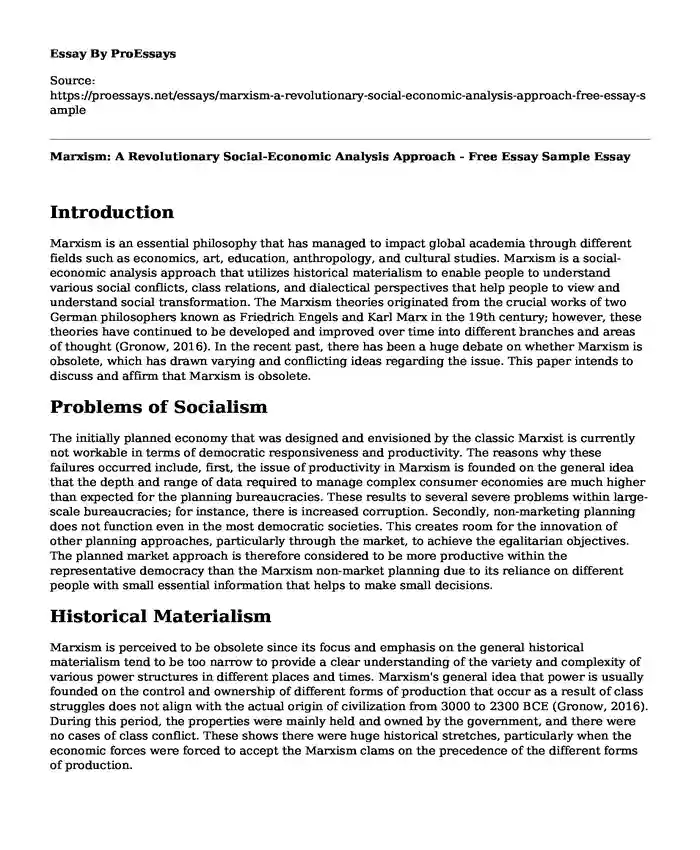Introduction
Marxism is an essential philosophy that has managed to impact global academia through different fields such as economics, art, education, anthropology, and cultural studies. Marxism is a social-economic analysis approach that utilizes historical materialism to enable people to understand various social conflicts, class relations, and dialectical perspectives that help people to view and understand social transformation. The Marxism theories originated from the crucial works of two German philosophers known as Friedrich Engels and Karl Marx in the 19th century; however, these theories have continued to be developed and improved over time into different branches and areas of thought (Gronow, 2016). In the recent past, there has been a huge debate on whether Marxism is obsolete, which has drawn varying and conflicting ideas regarding the issue. This paper intends to discuss and affirm that Marxism is obsolete.
Problems of Socialism
The initially planned economy that was designed and envisioned by the classic Marxist is currently not workable in terms of democratic responsiveness and productivity. The reasons why these failures occurred include, first, the issue of productivity in Marxism is founded on the general idea that the depth and range of data required to manage complex consumer economies are much higher than expected for the planning bureaucracies. These results to several severe problems within large-scale bureaucracies; for instance, there is increased corruption. Secondly, non-marketing planning does not function even in the most democratic societies. This creates room for the innovation of other planning approaches, particularly through the market, to achieve the egalitarian objectives. The planned market approach is therefore considered to be more productive within the representative democracy than the Marxism non-market planning due to its reliance on different people with small essential information that helps to make small decisions.
Historical Materialism
Marxism is perceived to be obsolete since its focus and emphasis on the general historical materialism tend to be too narrow to provide a clear understanding of the variety and complexity of various power structures in different places and times. Marxism's general idea that power is usually founded on the control and ownership of different forms of production that occur as a result of class struggles does not align with the actual origin of civilization from 3000 to 2300 BCE (Gronow, 2016). During this period, the properties were mainly held and owned by the government, and there were no cases of class conflict. These shows there were huge historical stretches, particularly when the economic forces were forced to accept the Marxism clams on the precedence of the different forms of production.
Marxist Politics
For a long time the Marxism politics, for instance, the Marxist-Leninist, have failed to attain success within the society. Some of the factors that have contributed to the failure of this politics include, first, increased disregard of representative democracy by the Marxist, thus causing destructive and extra-parliamentary method of politics that affects most people, particularly in the democratic capitalist nations. Secondly, increasing emphasis and focus on the form of capitalism, particularly in classical Marxism which made it hard to handle the electoral system differences from nation to nation seriously. This made the structural reality of the united states electoral system to militate or act against the third parties, therefore, being considered a theoretical challenge to the classical Marxists who were accorded the economic system (Weeks, 2011).
Conclusion
Although the Marxism theory has had a significant impact on the global academia, it has been deemed obsolete. Some of the factors that have made it obsolete include, first, failure of the Marxist politics to have a significant impact on the society due to various factors such as increased disregard of representative democracy. Secondly, Marxism portrays problems in socialism. Thirdly, Marxism failed to provide accurate information on historical materialism.
References
Gronow, J. (2016). On the formation of Marxism (p. 344). Brill. https://library.oapen.org/bitstream/handle/20.500.12657/32217/613393.pdf?sequence=1
Weeks, K. (2011). The problem with work: Feminism, Marxism, antiwork politics, and postwork imaginaries. Duke University Press. https://www.dukeupress.edu/the-problem-with-work
Cite this page
Marxism: A Revolutionary Social-Economic Analysis Approach - Free Essay Sample. (2023, Oct 21). Retrieved from https://proessays.net/essays/marxism-a-revolutionary-social-economic-analysis-approach-free-essay-sample
If you are the original author of this essay and no longer wish to have it published on the ProEssays website, please click below to request its removal:
- Criminal Justice and the American Bill of Rights Paper Example
- Being Moral in Philosophy - Essay Sample
- Essay Example on Famous Figures of Modernity: Charles Darwin
- Essay Sample on Nationalism vs Patriotism: Distinguishing Characteristics and George Orwell's View
- Aristotle's Tragic Hero: Flawed but Godly Character - Essay Sample
- Essay Sample on Codes of Ethics: Accuracy, Consent, Diversity & Professionalism
- Essay Example on Non-Profit Orgs Fight to End Poverty, Protect Children







